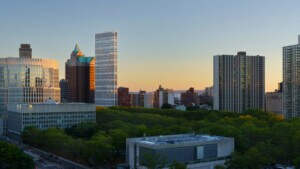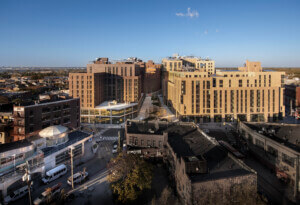In addition to the news about further delays at the World Trade Center site, this week’s issue of Downtown Express also reported on a deal brokered by Manhattan Borough President Scott Stringer that guaranteed public access to the “Great Hall” on the second floor of the Battery Maritime Building, and thus Stringer’s ULURP blessing. That this was billed as a victory took me by surprise, because, from what I remember about the project when I was writing about its review and subsequent passage by the LPC, this had always been the plan.
Well, sorta, confirmed Rob Rogers, the designer behind the project’s flashy new addition. “The great hall has always been public; the hours (and thus operating cost) are a negotiation between Dermot and various public agencies,” the Rogers Marvel Architects principal wrote in an email. Indeed, had I just gone back and read my own clips, I would have known as much:
The other half of the plan involves transforming the immense second floor waiting room into a great hall, which will serve as a public market by day and event space by night. The hall will be ringed by restaurants, cafes, a culinary school, and other food-oriented public spaces. Additionally, the rooftop will feature a bar and lounge that will round out the project’s public amenities.
Perhaps what had so engrained this public space in my mind was the above rendering, though the sort of semi-public deal the Express describes is not unlike the public plazas lining Midtown office towers, which earned their buidings an extra 20 percent in height while the plazas generally remain in control of the landlord and only open during business hours. To wit:
Developer Dermot Company agreed that the Great Hall on the second floor of the building will be open to the public for arts uses weekdays from 9 a.m. to 5 p.m., alternating weekends and several evenings a month. The rest of the time it will be closed for private revenue-generating parties and events.
It doesn’t exactly seem fair that “economic viability” is being used as an excuse to further privatize the space, especially when nearly every project, this one included, is barely viable, if at all. Still, the locals seem okay with the deal–“That sounds like a fair compromise,” Ro Sheffe, chair of CB1’s Financial District Committee, told Downtown Express–so who am I to complain?










